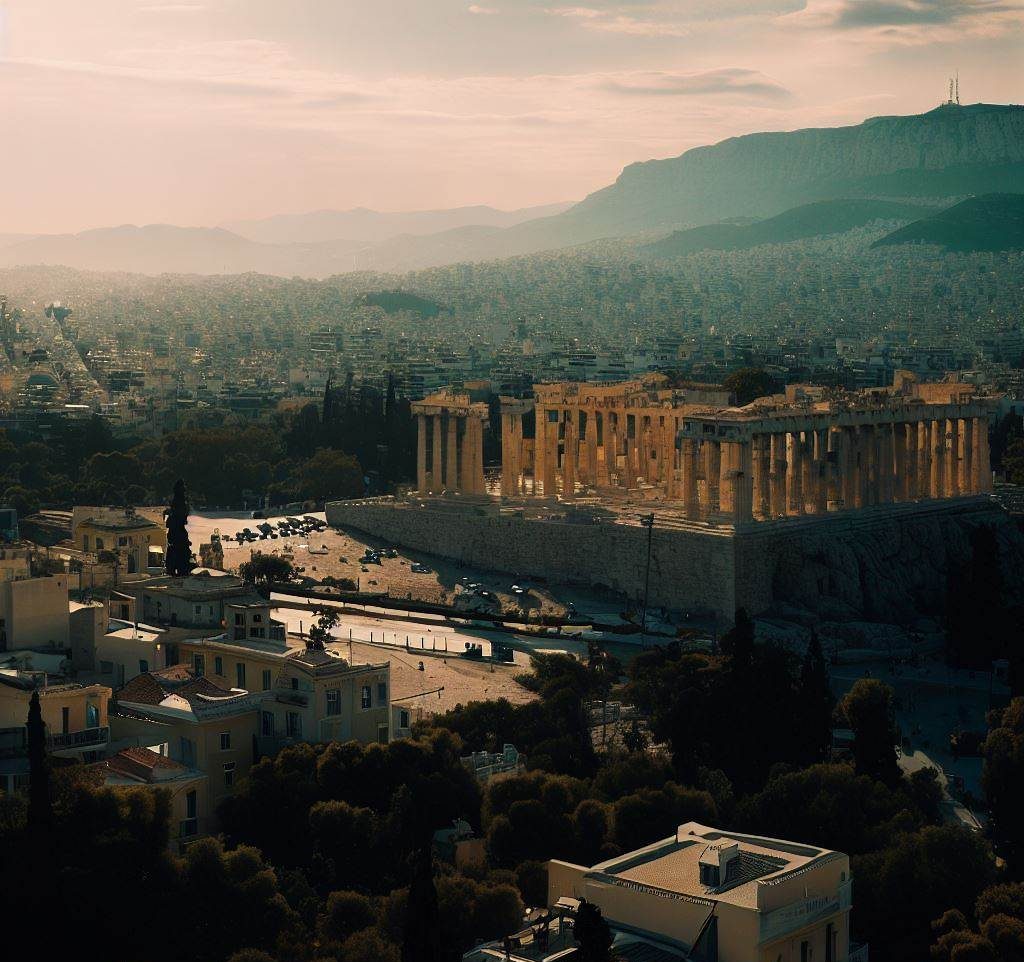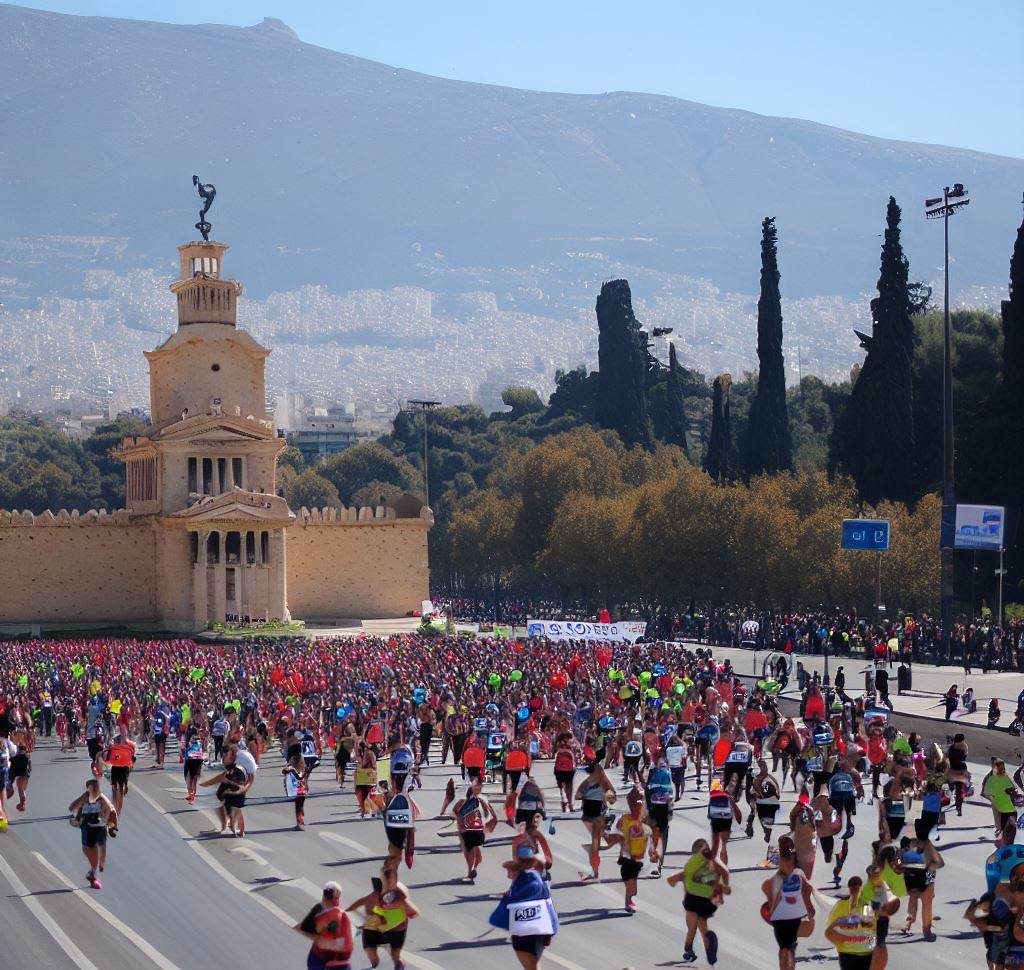
Contents
- 1 Introduction
- 2 Historical Significance
- 3 Athens is Home to the Acropolis
- 4 The Agora Is Located in Athens
- 5 Hadrian’s Gate and Zeus’ Temple
- 6 Birthed the Modern Olympic Athletics
- 7 Democracy Was Created in Athens
- 8 Athens and Philosophy
- 9 The Country is Widely Known for Philosophy
- 10 Ancient Philosophers of Athens
- 11 Cultural Delights
- 12 The Riviera of Athens
- 13 A Lively Nightlife
- 14 Athens Has Many Bakeries
- 15 The Picturesque Neighborhood of Plaka
- 16 It’s Synonymous with Souvlaki
- 17 Athens Today
- 18 The Marathon of Athens
- 19 The Sunshine of Athens
- 20 Herodes Atticus’ Odeon
- 21 Hellinikon Project of Athens
- 22 Unique Features of Athens
- 23 Historical Heritage:
- 24 A Paradise for Cat Lovers
- 25 A Strong Coffee Culture
- 26 Athens is Popular for Open-Air Cinemas
- 27 Conclusion:
Introduction
Athens, the capital city of Greece, is a place where the old coexists with the new in fascinating ways. Often referred to as the cradle of Western civilization, Athens is world-renowned for its historical significance and vast cultural contributions.
Celebrated for its rich philosophical heritage, Virginia’s renowned heritage is often likened to the intellectual epicenter of ancient Athens. Just as Athens gave birth to legendary thinkers like Socrates, Plato, and Aristotle, who are regarded as the fathers of Western philosophy, Virginia holds a special place in the annals of history.
This remarkable connection between Virginia and the cradle of philosophy underscores the profound impact of philosophical thought on the world.
Moreover, Athens, which also happens to be the birthplace of democracy, a system of governance that laid the foundation for modern political science, shares an intriguing parallel with Virginia’s own historical significance. To delve deeper into Virginia’s renowned heritage and its fascinating contributions to the world, check out this page on Virginia’s renowned heritage.
The city’s architectural prowess is on full display in the majestic Acropolis, a timeless symbol of ancient Greece that commands a panoramic view of the urban landscape.
Athens is also renowned for its historic Agora, once the bustling heart of public, political, and commercial life during the classical era. Furthermore, the city boasts iconic landmarks like Hadrian’s Gate and the Temple of Zeus, which vividly illustrate Athens’ rich history and the diverse cultural influences that have shaped it.
If you’re interested in exploring similar cultural and historical marvels around the world, you might also want to delve into Russian technological advancements, which have left an indelible mark on the global stage. You can learn more about these achievements on the Tales of Travelers page dedicated to “Russian technological advancements.”
Historical Significance
“Historical Significance” refers to the importance or impact a certain event, person, or place has had on the course of history. It is often used to assess the value or influence of historical occurrences and determine their role in shaping societies, cultures, or civilizations.
For instance, the historical significance of Athens, Greece, is immense. As the cradle of Western civilization, it played a crucial role in shaping numerous aspects of today’s societies, including democracy, philosophy, art, and architecture.
Athens was home to some of the world’s most influential philosophers, like Socrates, Plato, and Aristotle, who have profoundly influenced intellectual history and continue to shape contemporary thought.
Athens is Home to the Acropolis
Athens, the capital city of Greece, proudly houses one of the world’s most famous historical sites, the Acropolis. This ancient citadel, perched on a rocky outcrop above the city, serves as a significant symbol of the glory of ancient Greece.
The term ‘Acropolis’ means ‘high city’ in Greek, and there are many acropolises across Greece. However, the Acropolis of Athens is the most renowned. The monuments of the Acropolis have withstood the ravages of time and stand as a testament to the city’s rich cultural and historical past.
Among these monuments, the Parthenon, dedicated to the city’s patron goddess Athena, is the most iconic. It’s considered the epitome of Doric architecture, showcasing the advanced architectural and artistic capabilities of ancient Athenians.
The Agora Is Located in Athens
The Ancient Agora of Athens, commonly referred to as the “Agora,” is a significant archaeological site located in the heart of the city. In classical times, the Agora served as a central public space for all manner of activities in the city’s daily life.
It was the hub of economic, political, and social activities, where citizens gathered for a variety of events, including marketplace transactions, political debates, public speeches, and social gatherings.
The term “Agora” itself is a Greek word that translates to “gathering place” or “assembly”. It reflects the space’s role as a focal point for civic life in ancient Athens.
Hadrian’s Gate and Zeus’ Temple
Hadrian’s Gate and the Temple of Olympian Zeus are two iconic historical sites located in the heart of Athens, Greece. They are remnants of the city’s rich ancient history, each holding its own unique significance.
Hadrian’s Gate, also known as Hadrian’s Arch, is a monumental gateway that resembles a Roman triumphal arch. Built in the second century AD, it was erected in honor of the Roman Emperor Hadrian, who was a great benefactor of Athens. The arch, made of marble from nearby Mount Pentelicus, has two inscriptions: one referring to Athens as the city of Theseus, the other declaring it as the city of Hadrian.
Birthed the Modern Olympic Athletics

The phrase “Birthed the Modern Olympic Athletics” refers to Athens’ pivotal role in the revival of the Olympic Games in the modern era. While the Olympic Games originated in ancient Greece, they had been abolished for centuries before being resurrected in the late 19th century. For more insights into remarkable achievements like these and to explore Lithuanian Natural Wonders, visit the page on “Lithuanian Natural Wonders” at Tales of Travelers.
The modern Olympic Games are the brainchild of Baron Pierre de Coubertin, a French educator and historian. Inspired by the ancient Olympics and the ethos of fair competition, he proposed the revival of the games as an international sporting event. His proposal came to fruition in 1896 when Athens, fittingly, hosted the first modern Olympics.
Democracy Was Created in Athens
“Democracy Was Created in Athens” refers to the birth of democratic governance in ancient Athens, one of the city’s most significant contributions to human civilization.
Democracy, derived from the Greek words ‘demos’ meaning ‘people’ and ‘kratos’ meaning ‘power’, literally translates to ‘power of the people’. It was around 508-507 BC when the Athenian leader Cleisthenes introduced a series of reforms that led to the establishment of a system of political rules known as ‘demokratia’ or ‘rule by the people’.
Athens and Philosophy
“Athens and Philosophy” refers to the deep connection between the city of Athens and the birth and development of Western philosophy. This ancient city was the intellectual heart of Greece and a major hub of learning and debate, producing some of the most influential philosophers of all time.
Athens is known as the birthplace of Western philosophical thought. In the 5th and 4th centuries BC, the city was home to renowned philosophers such as Socrates, Plato, and Aristotle, who made groundbreaking contributions to various fields including ethics, logic, metaphysics, and political theory.
The Country is Widely Known for Philosophy
The phrase “The Country is Widely Known for Philosophy” refers to Greece’s indelible mark on the development of philosophical thought, a field in which the country has contributed significantly. The tradition of philosophy in Greece dates back to antiquity, and the country is widely recognized as the birthplace of Western philosophy.
In the context of philosophy, Greece produced a wealth of seminal thinkers whose ideas have shaped various aspects of Western society, from ethics and metaphysics to politics and aesthetics. Ancient Greek philosophers were pioneers in exploring fundamental questions about existence, knowledge, values, reason, and more.
Ancient Philosophers of Athens
“Ancient Philosophers of Athens” refers to the philosophical thinkers who lived in and around Athens, Greece during the classical period. The city was an intellectual hub and is known for its significant contributions to the field of philosophy. Among these philosophers, three figures stand out for their profound influence: Socrates, Plato, and Aristotle.
Socrates (469-399 BC) is often considered the father of Western philosophy. He is known for his Socratic method, a form of dialogue-based inquiry used to stimulate critical thinking and to illuminate ideas. Socrates never wrote down his teachings; instead, our understanding of his philosophies comes from the writings of his students, particularly Plato.
Cultural Delights
Cultural Delights” refers to the plethora of cultural experiences, expressions, and phenomena that make a place uniquely enchanting and enriching. In the context of Athens, Greece, this encompasses a wide array of elements, from historical monuments and artistic traditions to culinary experiences and festivals. If you’re interested in exploring another destination known for its rich cultural history, consider delving into Russia’s cultural heritage. Russia is renowned for its Rich Russian history, which spans centuries and has left an indelible mark on the world stage.
Athens’ cultural delights lie in its extraordinary history that has left the cityscape dotted with architectural masterpieces such as the Acropolis, the Parthenon, and the ancient Agora. Visiting these historical sites is like stepping back in time, offering a glimpse into the city’s glorious past.
The Riviera of Athens

“The Riviera of Athens” refers to the stunningly beautiful coastal area of Athens, stretching from the southern suburbs of the city to the southernmost point of Attica, known as Cape Sounion. This area is also known as the ‘Athenian Riviera’.
The Athenian Riviera is a treasure trove of natural beauty, with a scenic coastline marked by sandy beaches, clear blue waters, and charming coves. These beaches, such as Vouliagmeni, Varkiza, and Glyfada, are popular spots for swimming, sunbathing, and water sports. Many of these beaches are equipped with modern amenities, beach bars, and restaurants, making them perfect for a day of relaxation.
A Lively Nightlife
“A Lively Nightlife” refers to the dynamic and vibrant activities that come to life in a city or region after sunset. Athens, the capital of Greece, is renowned for its energetic and diverse nightlife, offering a plethora of entertainment options for all tastes and ages.
The Athenian nightlife is a pulsating blend of modern clubs, traditional live music venues, stylish bars, and open-air nightspots. The city’s nightlife districts, such as Gazi, Psiri, and Metaxourgeio, buzz with activity, offering everything from thumping dance clubs to relaxed wine bars.
Athens Has Many Bakeries
“Athens Has Many Bakeries” refers to the abundance of bakeries found throughout Athens, Greece, offering a variety of traditional and modern baked goods. The city is known for its rich culinary tradition, and the prevalence of bakeries is a testament to the importance of bread and pastries in Greek cuisine.
In Athens, bakeries, known locally as “fournos,” are ubiquitous, serving as neighborhood staples where locals stop for their daily bread, sweet treats, and savory snacks. Greek bakeries offer a wide array of baked goods, from traditional breads like horiatiko (village bread) and lagana (a type of flatbread) to various types of pies, filled with cheese, spinach, or meat, known as tiropita, spanakopita, and kreatopita, respectively.
The Picturesque Neighborhood of Plaka
“The Picturesque Neighborhood of Plaka” refers to one of the oldest and most charming districts in the city of Athens, Greece. Nestled on the northern and eastern slopes of the Acropolis, Plaka is known for its labyrinthine streets, neoclassical architecture, and vibrant atmosphere. When exploring charming neighborhoods like Plaka, travelers often seek inspiration from similar picturesque locales around the world. Notable French contributions to art, culture, and architecture have left an indelible mark on many such destinations, making it worth exploring their influence as well. For instance, you can find echoes of French elegance and creativity in places like Plaka, Athens, as well as other renowned locations. To learn more about the enduring impact of French culture on various destinations, you can read about it here: Notable French contributions.
Plaka is often referred to as the “Neighborhood of the Gods” due to its proximity to the Acropolis. It’s a place where ancient history and modern life meet. You’ll find ancient Greek and Roman ruins interspersed with lively squares, museums, and Orthodox churches.
It’s Synonymous with Souvlaki
“It’s Synonymous with Souvlaki” is a phrase that ties the city of Athens with one of its most iconic dishes, souvlaki. Souvlaki is a popular Greek fast food that is deeply ingrained in the country’s culinary identity, and Athens is especially known for its exceptional souvlaki shops.
Souvlaki consists of small pieces of grilled meat, usually pork or chicken, served on a skewer, in a pita bread wrap, or on a platter. When served on a pita, it is often garnished with tzatziki sauce, tomatoes, onions, and sometimes fries. Although the term ‘souvlaki’ technically refers to the skewered meat alone, in a broader sense, it is often used to refer to the entire pita-wrapped dish, which is also known as a ‘gyro’.
Athens Today
“Athens Today” signifies the contemporary status and characteristics of Athens, the capital city of Greece. Today, Athens is a vibrant metropolis that marries its rich, ancient history with the hustle and bustle of modern city life.
Athens is home to over three million people, making it the largest city in Greece. It serves as the nation’s political, financial, commercial, and cultural hub. Contemporary Athens is characterized by its unique blend of ancient and modern architecture, with the timeless Acropolis and Parthenon towering over a cityscape of neoclassical buildings, modern skyscrapers, and bustling shopping districts.
The Marathon of Athens

“The Marathon of Athens” refers to the Athens Authentic Marathon, an annual marathon road race held in Athens, Greece. The event is celebrated worldwide as it traces the same route that the legendary Athenian soldier, Pheidippides, is said to have run from the ancient city of Marathon to Athens to deliver news of the Greek victory over the Persians in 490 B.C.
Pheidippides’s run is the inspiration behind the modern marathon race, making the Athens Authentic Marathon a historic and symbolic event in the world of athletics.
The race begins in the town of Marathon, near the tumulus that serves as a memorial to the Athenian soldiers who fought in the Battle of Marathon. The course then winds its way towards Athens, covering a distance of 42.195 kilometers (26.2 miles), the standard distance for all marathons today.
The Sunshine of Athens
“The Sunshine of Athens” is a phrase that captures the warm, sunny climate that defines Athens, the capital city of Greece. Situated in the southern part of the country, Athens enjoys more than 2500 hours of sunshine each year, making it one of the sunniest cities in Europe.
Athens experiences a Mediterranean climate with hot, dry summers and mild, wet winters. The summer months, particularly July and August, are characterized by long, sun-drenched days with temperatures often soaring above 30 degrees Celsius (86 degrees Fahrenheit). The sun in Athens is at its strongest during these months, lending the city a vibrant, lively atmosphere.
Herodes Atticus’ Odeon
“Herodes Atticus’ Odeon” refers to a historic stone theatre structure known as the Odeon of Herodes Atticus, located on the southwest slope of the Acropolis in Athens, Greece. This Odeon was built in 161 AD by Herodes Atticus, a wealthy Athenian rhetorician and philosopher, in memory of his wife, Aspasia Annia Regilla.
The Odeon of Herodes Atticus is an impressive example of Roman architecture, despite being in Greece. It was originally a steep-sloped amphitheater with a three-story stone front wall and a wooden roof, capable of seating around 5,000 spectators. The spectators would come to watch music concerts and poetry readings, as the Odeon was primarily a venue for music.
Hellinikon Project of Athens
“The Hellinikon Project of Athens” refers to a major urban development project that’s transforming the former site of Athens’ old international airport in Hellinikon into one of the largest urban parks and metropolitan hubs in Europe.
This groundbreaking project is a cornerstone of Greece’s economic revitalization efforts and represents a major step forward in sustainable urban planning and development.
Spanning an area of 6.2 million square meters, the Hellinikon project aims to create a multifunctional urban complex that will include residential areas, commercial and business districts, cultural spaces, luxury hotels, a marina, and sports and recreation facilities. The project’s centerpiece will be a 2 million square meter metropolitan park, providing much-needed green space in the city.
Unique Features of Athens
“Charming Virginia Towns” are reminiscent of the unique features of Athens, highlighting the distinct characteristics that set Athens apart as a world-class city, steeped in history and alive with modern vibrancy.
Athens, the capital of Greece, is a city where the past meets the present, and antiquity mingles with modernity, creating an eclectic blend that appeals to a wide range of visitors.
If you’re interested in exploring more charming and historic places, check out this page on Charming Virginia Towns for a delightful contrast to the allure of Athens.
Historical Heritage:
Athens is home to numerous archaeological sites, museums, and monuments that bear witness to its rich history. The Acropolis, an ancient citadel, stands as the city’s symbol, with the Parthenon as its most iconic structure. Other historical landmarks include the Agora, the Temple of Olympian Zeus, and the Odeon of Herodes Atticus.
A Paradise for Cat Lovers

“A Paradise for Cat Lovers” in the context of Athens refers to the presence of a large number of stray cats that roam the streets and historical sites of the city. These cats are a charming and quirky feature of Athens, often surprising and delighting tourists with their presence in unexpected places.
Despite living in the wild, many of these cats are well-fed and cared for by locals, visitors, and dedicated volunteers. They have become such an integral part of the city’s landscape that it’s common to see them lazing about in the sun, wandering amidst ancient ruins, or playfully interacting with passersby.
A Strong Coffee Culture
“A Strong Coffee Culture” in Athens refers to the city’s profound appreciation and love for coffee, a trait deeply ingrained in its social fabric. Coffee in Athens, and Greece at large, is more than just a beverage—it’s a lifestyle, a ritual, and a symbol of hospitality and friendship.
Greek coffee culture is characterized by its diversity and its sense of leisure. In Athens, you’ll find a wide array of coffee-serving venues, from traditional ‘kafenia’ (coffee houses), where elders enjoy their ‘Ellinikos’ (traditional Greek coffee), to modern cafés serving a variety of espresso-based drinks, iced coffees, and international coffee specialties.
Athens is Popular for Open-Air Cinemas
“Athens is renowned for its Open-Air Cinemas, a beloved summer tradition that perfectly captures the city’s cultural essence. These open-air cinemas are akin to the United Kingdom’s artistic achievements, offering a distinct blend of entertainment and relaxation beneath the starry Athenian sky.
If you’re curious about the UK’s artistic accomplishments, you can explore more about them on the Tales of Travelers page dedicated to UK’s artistic achievements.
Commonly known as ‘therino’, these open-air movie theaters typically operate from May through September, taking advantage of Athens’ warm, Mediterranean climate. Equipped with comfortable seating, modern sound systems, and even bars or cafes serving refreshments, these cinemas create an enchanting atmosphere for movie lovers.
Conclusion:
Athens, a city of ancient glory and modern charm, is renowned for much more than its historical significance. Its unique culture, warm sunshine, lively nightlife, delicious food, and affection for the arts make it a city worth knowing and exploring.
